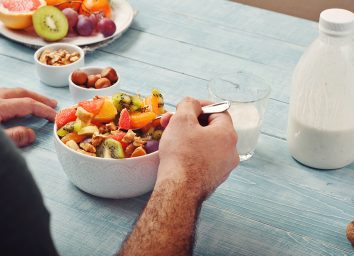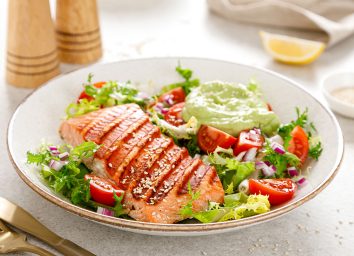Want a Lean Body For Good? Eat These 8 Foods Every Day

Getting "lean"—having a muscular physique and a low body fat percentage—is a little easier said than done. Sure, you know that maintaining a balanced diet and getting plenty of exercise helps, but what you may not be aware of is that there are specific types of foods you'll want to focus on that can support your goals. While there are a lot of factors that affect your body type and weight, experts say that incorporating certain nutrient-dense lean proteins, vegetables, nuts, and whole grains can go a long way in achieving that svelte figure you're after.
"Maintaining a lean body can most certainly be supported by the right food choices, particularly as we age," says Gretchen Zimmermann, RD and the senior director of cardiometabolic disease for Vida Health. "First and foremost, prioritize protein. Quite simply, protein breaks down into amino acids, which are used to maintain and repair muscle tissue, among many other essential functions in the body."
Remember: slow and steady wins the race when it comes to weight loss and body composition. By making small, sustainable changes in your diet, you're more likely to maintain that lean body for good—and you can start by adding the following foods to your weekly grocery list. Here are the foods to stock up on, and for inspiration on how to incorporate some of these foods, check out our list of the Eating Habits to Lose Abdominal Fat As You Age.
Eggs
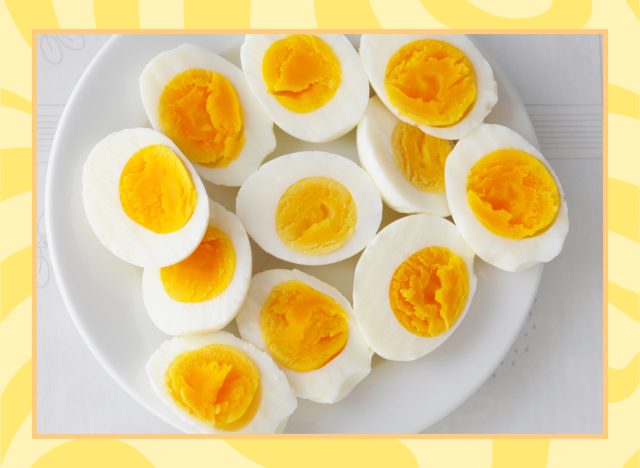
Skip the sugar-laden pastries and cereals and start your day with an omelet or avocado toast with a couple of poached eggs—you'll be thankful when those familiar hunger pangs don't hit during your mid-morning meetings, driving you to snack.
"Eggs contain high-quality protein which helps to keep us full," says Stephanie Hnatiuk, RD. "Because protein promotes fullness and satiety after meals, including it means you'll feel less hungry and experience fewer food cravings later in the day. Eggs are also a good source of a nutrient called choline, which promotes muscle recovery after exercise. This is key for anyone who wants to build muscle tissue while reducing body fat."
Don't forget to eat the yolk! Not only does the yolk contain nearly half the protein, but it also offers a much higher concentration of nutrients. In fact, all of the egg's vitamin D, A, E, and K are in the yolk, and it also contains more calcium, iron, copper, manganese, phosphorus, selenium, and zinc.
Cashews
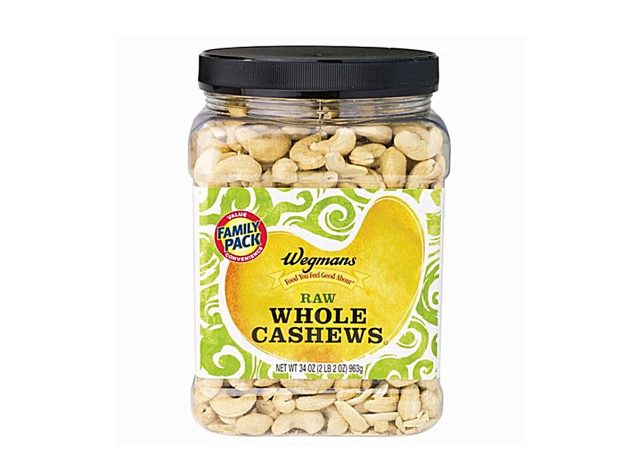
"If you want to keep lean you must replace the snacks that will halt your progress with ones that will help," says Sam Maclennan, RD and head nutritionist at Meal Prep Source. "This is where cashew nuts come in. Cashews contain an amazing mixture of antioxidants, protein, unsaturated fatty acids, fiber, vitamins, and minerals."
According to Maclennan, this combo has anti-inflammatory and cardioprotective properties—but better yet, it can also help you stay full for longer. Not only that, but the magnesium in cashews can actually help regulate the carbs and fats you consume.
Maclennan advises adding one serving (about 1 ounce or 28 grams) of these rich, buttery nuts to your daily diet—either by snacking on them plain or in a trail mix or tossing them into salads and grain bowls for some satisfying crunch.
Kidney Beans
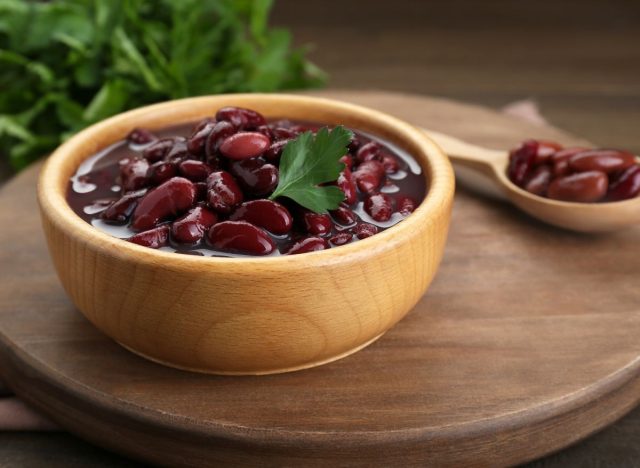
"Beans and lentils are high in protein which promotes fullness after meals," says Hnatiuk. "The other benefit of these plant protein sources is that they are also full of satiating fiber. Interestingly enough, a high-fiber diet can also lead to changes in the gut microbiome that can influence your weight and body fat mass."
While all beans are packed with protein and fiber, one 2007 study published in The International Journal of Medical Sciences suggested kidney beans may have a special superpower when it comes to slimming down. Researchers found that overweight men and women who took an extract from white kidney beans for 30 days lost an average of 5.5 pounds more weight and significantly more fat mass and waist circumference than those who didn't consume this extract.
Kidney beans are surprisingly versatile—try including them in vegetarian chili, three-bean salad, or hearty soup.
Berries
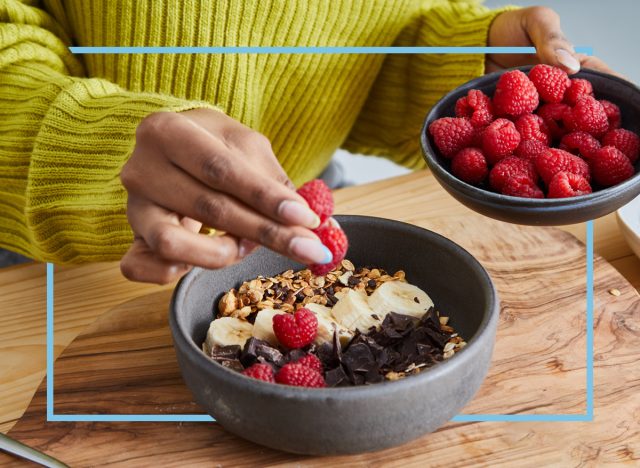
"Many people think they need to avoid fruit to lose weight, but the opposite is true," says Hnatiuk. "Fruit is high in filling fiber—and while it does contain carbs and sugar, it's a small amount that can satisfy sweet cravings and provide your brain and muscles with energy to perform well during exercise. A diet too low in carbohydrates, especially around exercise, can trigger overeating later in the day. This can lead to excess snacking on high-calorie foods."
The other benefit of fruit, says Hnatiuk, is its polyphenol content—these plant compounds can improve the health of our gut microbiome, reduce inflammation, and promote exercise recovery.
Each fruit has its own unique nutritional benefits, but Holly Klamer, RDN and writer at MyCrohnsAndColitisTeam, says berries should definitely be a regular fridge staple.
"Berries can play an important role when trying to keep a lean body because they are low in calories, high in antioxidants, high in fiber, and are considered a low glycemic index food," she explains. "This means even though berries have sugar, they won't spike blood sugar after eating. The fiber from berries will help move food through the digestive tract which can help prevent constipation and bloating."
Consider incorporating berries into a smoothie, spinach salad, overnight oats, or yogurt parfait.
Salmon
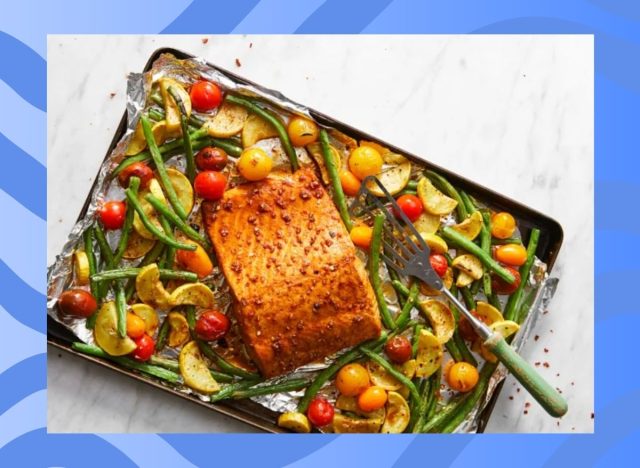
"Protein plays a vital role in maintaining muscle whilst losing fat which is what will keep your body looking lean," says Maclennan.
According to Zimmermann, it's a good idea to focus on protein sources that are also high in omega-3 fatty acids, as studies suggest these fatty acids may send direct signals to muscle tissue to promote growth. And as you may or may not know, the more muscle you have, the more calories your body naturally burns.
There are three types of omega-3 fatty acids: EPA (eicosapentaenoic acid), DHA (docosahexaenoic acid), and ALA (alpha-linolenic acid). Salmon boasts two out of three: EPA and DHA.
"The omega 3's in salmon are beneficial for heart, joint health, and maintaining muscle mass," explains Klamer.
The best part about salmon is that it's so flavorful on its own, meaning you don't need any rich sauces—and that can keep the calorie and fat count on your meal down. Whether you're baking it, grilling it, or air frying it, all you need to amp up the flavor is a dash of olive oil, herbs, lemon, and garlic.
Greek Yogurt
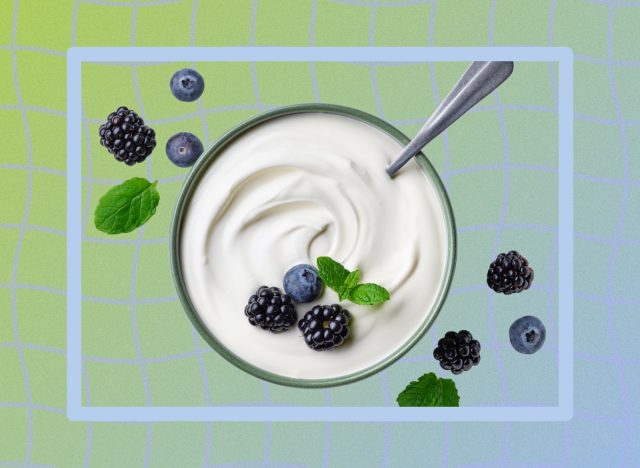
There are multiple reasons why Greek yogurt is a phenomenal food to eat on a daily basis. For one, it's far more satiating than traditional yogurt.
"Greek yogurt can help maintain a lean body because it is a good source of protein and bone-building nutrients," says Klamer. "It can easily be paired with fruit and a spoon of nut butter for a filling and balanced snack or meal."
It's not just the amount of protein that makes this a smart choice, either—it's also the specific types that Greek yogurt contains. According to Amelia Brown, a practicing RD who works in collaboration with Redwood Reserves, Greek yogurt is packed with fast-digesting whey protein as well as slow-digesting casein protein.
"The combination of these two proteins is super helpful for maintaining a lean body," she says.
Quinoa

By now, you're likely familiar with this super grain, which surged in popularity over the last ten years. But there's a good reason why quinoa has been in the nutritional spotlight, according to Leah Johnston, RD at SRW.
"Whole grains—like quinoa, brown rice, and oats—contain fiber and protein, both of which help promote satiety to keep you full," she explains. "That means whole-grain products can also be useful for keeping your body lean for the long-term."
A small 2017 study in the American Journal of Clinical Nutrition found that participants who consumed whole grains not only took in more fiber but also burned an extra 100 calories per day over eight weeks when compared with participants who ate refined grains.
Quinoa happens to have the highest protein contents of any grain. A quinoa pilaf makes for a satisfying side dish with fish or chicken, or you can also use this grain as a base for seasoned beans and vegetables. For a sweeter take, replace your morning bowl of oats with a quinoa breakfast porridge with berries and seeds.
Cottage Cheese
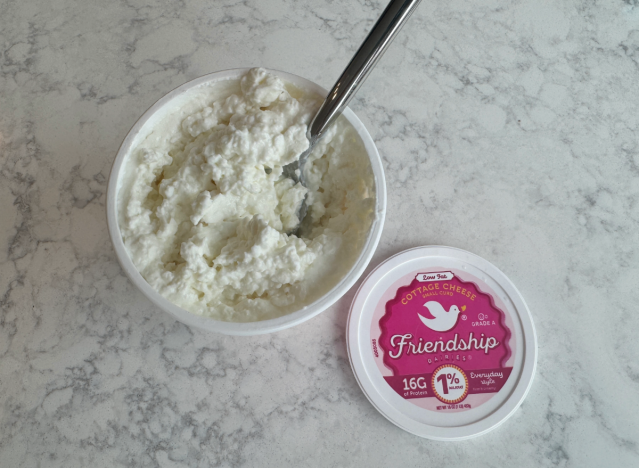
Unless you're vegan or lactose intolerant, there's no reason to ditch dairy. In fact, a 2013 review in Nutrition & Metabolism showed that dairy can help boost your metabolism by enhancing muscle mass.
"Cottage cheese is an amazing food to help sustain a lean body," says Johnston. "A low-calorie, all-in-one snack, the combination of protein and fat will keep you satisfied for a few hours which, in turn, may lessen your overall calorie intake.."
One cup of cottage cheese packs a whopping 24 grams of protein—that's more than a 3-ounce steak has!
It's worth noting that some brands also contain probiotics to help increase good bacteria into the gut—which could help you lose weight and keep it off, according to Johnston.
There are so many creative ways to eat cottage cheese, too: spread it onto whole-grain toast or crackers with fruit, mix it with pesto or hot sauce for a savory dip, or add it to pasta dishes to give them a creamy texture.

